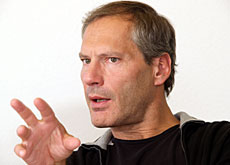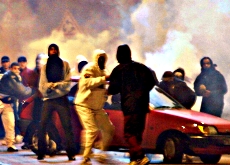“We don’t have these sorts of ghettos”

A Swiss integration expert tells swissinfo the violent unrest that has shaken a number of French cities could not happen in Switzerland.
But Thomas Kessler, who is the brains behind a successful integration project in Basel, says the Swiss government has made mistakes in the past in the way it deals with foreigners.
Riots flared in France at the end of October when youths in the suburbs of the capital, Paris, took to the streets following the accidental deaths of two teenagers. Consecutive nights of unrest followed during which cars and buildings were set alight.
The crisis has led to national soul-searching about France’s failure to integrate its African and Muslim minorities.
swissinfo: The violence in France has been followed with alarm in neighbouring Switzerland. Is it possible that something similar could happen here?
Thomas Kessler: Without a doubt, the answer is no. In Switzerland the foreign population taken as a whole is totally unlike what you see in France or other countries with a colonial heritage. Foreigners who live in Switzerland are of many different nationalities. The sort of ghettos that exist in the French suburbs don’t exist here.
swissinfo: Before the outbreak of the violence did you imagine something like this could happen in France?
T.K.: When I was last in Paris I visited the areas [where rioting has taken place] and realised that this was likely to happen at some point. And the French authorities also knew this. The police presence was unusually high in the weeks leading up to the start of the troubles.
swissinfo: It all started in Paris, but the situation in Mulhouse across the border from Basel has also been very tense…
T.K.: Mulhouse is small but it’s also the case there that you have a city divided between affluent residential areas including the inner city itself, and poor ghetto buildings which are home to African migrants. The key point here is the division of the city and this is the case outside the French capital in other parts of the country.
Things are different in Switzerland, which since the moment it was founded has been a multicultural place… there is no single Swiss language and no Swiss religion. It is only in political terms that Switzerland can be defined as a single entity.
The problems we have are also [more] tangible. In the 1980s there was an influx of people from the Balkans and from Turkey. Our integration policy for them has not been without its problems, but we are working on putting these right.
swissinfo: You once said that the lack of efforts to integrate people and give them equal opportunities was like a ticking time bomb…
T.K.: Yes, and it’s true that Switzerland made mistakes in its policies towards foreigners, particularly in the 1980s and early 1990s. The concept of equal opportunities for all was ignored and the focus was very much on seasonal workers [who would spend some time here before leaving and being replaced by others].
But Swiss society can only function if the successful principle of equal opportunities is adhered to. The rot would set in if we allowed the country to be divided into winners and losers.
swissinfo: The integration programme you developed in Basel is considered by many to be a model for other places. What is so special about it?
T.K.: The programme is wide-ranging and extends as far as the issue of city planning. We want to have a positive influence on the social make-up of the local population and we seek to ensure that the city is not divided into rich and poor areas.
One example is the way we have been renovating former employment districts by buying cheap buildings, restoring them at low cost and then putting them back on the market. This costs absolutely nothing because the project pays its way. What then happens is that middle-income families move into districts which are home to poorer residents of the city.
swissinfo: And this has proved to be successful?
T.K.: The strategy is very clear [but] when it is put into practice the plans are subject to the laws of economics and business. It’s fair to say that there are parts of the city which do not yet have the social mix we would like to see and not all nationalities are benefiting from equal opportunities.
swissinfo: Amid all the talk of integration, Switzerland also has a policy of zero-tolerance when it comes to so-called “preachers of intolerance”.
T.K.: Yes, and there should be absolutely no tolerance shown here because these preachers are an affront to our basic morals and our constitution. Switzerland as a country of minorities has come up with strict rules which are founded on the notions of respect, protection of minorities and accommodation of conflicting interests.
Hate, propaganda, feelings of superiority and the spreading of inequality are all a direct attack on our identity and constitution. We shouldn’t accept this under any circumstances. Anyone [who expounds such views] should be brought before a judge immediately.
swissinfo-interview: Etienne Strebel
Thomas Kessler has been coordinator for questions relating to migration and integration for the cantonal government in Basel City since 1998.
The focus of the cantonal programme aimed at integrating foreigners is on equal opportunities.
The Basel city authorities say people from 150 countries have settled in the area and more than 30,000 people travel over the border to Basel every day to work.

In compliance with the JTI standards
More: SWI swissinfo.ch certified by the Journalism Trust Initiative

You can find an overview of ongoing debates with our journalists here . Please join us!
If you want to start a conversation about a topic raised in this article or want to report factual errors, email us at english@swissinfo.ch.